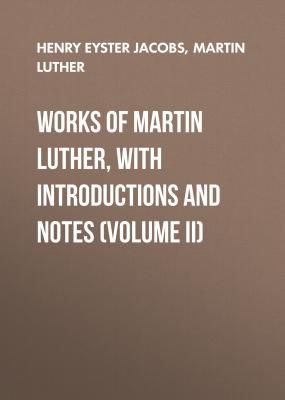Works of Martin Luther, with Introductions and Notes (Volume II). Martin Luther
Читать онлайн.| Название | Works of Martin Luther, with Introductions and Notes (Volume II) |
|---|---|
| Автор произведения | Martin Luther |
| Жанр | Философия |
| Серия | |
| Издательство | Философия |
| Год выпуска | 0 |
| isbn |
140
A statement made by Augustinus Triumphus. See above, p. 73, note 5; and below, p. 246.
141
The Cardinal della Rovere, afterwards Pope Julius II, held at one time the archbishopric of Avignon, the bishoprics of Bologna, Lausanne, Coutances, Viviers, Mende, Ostia and Velletri, and the abbacies of Nonantola and Grottaferrata. This is but one illustration of the scandalous pluralism practised by the cardinals. Cf. Lea, in
142
The complaint that the cardinals were provided with incomes by appointment to German benefices goes back to the Council of Constance (1415). C. Benrath, p. 87, note 17.
143
The creation of new cardinals was a lucrative proceeding for the popes. On July 31, 1517, Leo X created thirty-one cardinals, and is said to have received from the new appointees about 300,000 ducats. Needless to say, the cardinals expected to make up the fees out of the income of their livings. See
144
The famous Benedictine monastery just outside the city of Bamberg.
145
The proposal made at Constance (see above, p. 82, note 2) was more generous. It suggested a salary of three to four thousand gulden.
146
As early as the XIV Century both England and France had enacted laws prohibiting the very practices of which Luther here complains. It should be noted, however, that these laws were enforced only occasionally, and never very strictly.
147
The papal court or curia consisted of all the officials of various sorts who were employed in the transaction of papal business, including those who were in immediate attendance upon the person of the pope, the so-called "papal family." On the number of such officials in the XVI Century, see Benrath, p. 88, note 18, where reference is made to 949 offices, exclusive of those which had to do with the administration of the city of Rome and of the States of the Church, and not including the members of the pope's "family." The
148
On the annates, see Vol. I, p. 383, note 1. Early in their history, which dates from the beginning of the XIV. Century, the annates (
Luther here alleges that the annates are not applied to their ostensible purpose, viz., the Crusade. This charge is repeated in the
149
On the crusading-indulgences, see Vol. I, p. 18.
150
i. e., As was done by the Council of Basel. See above, p. 84, note i.
151
The canons are the clergy attached to a cathedral church who constituted the "chapter" of that cathedral, and to whom the right to elect the bishop normally belonged.
152
This whole section deals with the abuse of the "right of reservation," i. e., the alleged right of the pope to appoint directly to vacant church positions. According to papal theory the right of appointment belonged absolutely to the pope, who graciously yielded the right to others under certain circumstances, reserving it to himself in other cases. The practice of reserving the appointments seems to date from the XII Century, and was originally an arbitrary exercise of papal authority. The rules which came to govern the reservation of appointments were regarded as limitations upon the authority of the pope, The rule of the "papal months," as it obtained in Germany in Luther's time, is found in the Concordat of Vienna of 1448 (Mirbt,
153
i. e., Church offices which carried with them certain rights of jurisdiction and gave their possessors a certain honorary precedence over other officials of the Church. See Meyer in
154
Charles V, though elected emperor, was not crowned until October 22d.
155
i. e., A living which has not hitherto been filled by papal appointment.
156
This rule, like that of the "papal months," is found in the Concordat of Vienna. Luther's complaint is reiterated in the
157
158
In 1513 Albrecht of Brandenburg was made Archbishop of Magdeburg and later in the same year Administrator of Halberstadt; in 1514 he became Archbishop of Mainz as well. In 1518 he was made cardinal.
159
This rule, like the others mentioned above, is contained in the Concordat of Vienna.
160
Cf. The
161
The
